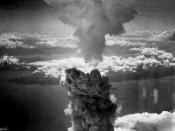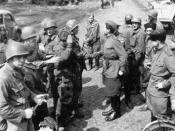During the past few centuries the struggle for power amongst European states has resulted in its actors joining and switching alliances to prevent one state from dominating the others in a classic example of balance of power politics. This essay aims to show how the role of the European actors was changed as a consequence of World War Two resulting in the end of balance of power politics and a shift from a multipolar to a bipolar world.
Prior to the Second World War the European state system was multipolar, dominated by five major powers namely France, England, Germany, Russia and Italy, none of who were strong enough to dominate the rest (Waltz, 1979; Mansbach, 2000). Coalitions and alliances were critical during this period and this institution became known as balance of power politics. Balance of power philosophies became deeply imbedded in 18th century politics with its actors likening their role to a "game" in which they could intervene in, to move the balance towards the weaker alliance (Mansbach, 2000).
The balance of power system worked well during the 18th and early 19th centuries as it prevented states gaining power over the rest. The late 19th century however saw the major powers enter the era of modernisation characterised by industrialisation, urbanisation, political centralisation, and the rise of mass participation, which saw the conditions that facilitated balance of power politics disappear (Papayoanou, 1996). Alliances began to form into two distinct blocs, the equality of alliance partners within these blocs and competition between the two rival camps strongly contributed to the outbreak of World War One effectively ending a century of great-power peace which culminated with the United States entering the war on the side of the British, French and Russians against the German Austro-Hungarian and Ottoman empires (Waltz, 1979; Wittkopf, Kegley...


